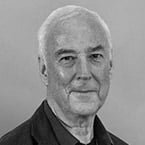
Jeffrey W. Pollard, PhD, a member of the AACR whose work contributed to improved understanding of the biology of breast cancer, died May 1, 2023, at the age of 73.
Pollard was born January 23, 1950. He earned a degree in zoology from Sheffield University, then a PhD at Imperial Cancer Research Fund (now known as Cancer Research UK). He did postdoctoral work at Ontario Cancer Institute, then joined the faculty at King’s College University of London.
In 1988, he joined the Albert Einstein College of Medicine, where he stayed for more than two decades, holding positions as the Louis Goldstein Swann Chair in Women’s Health, deputy director of the cancer center, and director of the Center for the Study of Reproductive Biology and Women’s Health. In 2013, he moved to Edinburgh to take a position as director of the MRC Centre for Reproductive Health. He was also a professor of Resilience Biology in the College of Medicine and Veterinary Medicine at the University of Edinburgh.
Pollard’s work centered on women’s reproductive health, most recently focusing on the mechanisms of action of female sex steroid hormones in controlling cell proliferation, and on the tumor microenvironment of breast cancer. He was a founding member of Macomics Ltd., a start-up company aimed at developing therapies targeting tumor-associated macrophages.
Pollard was a Fellow of the Royal Society of Edinburgh, the Royal Society of Biology, the Academy of Medical Sciences, and the American Association for the Advancement of Science.
Pollard received the Rothschild Yvette-Meynet Curie award; the Medal of Honor for Basic Science Research from the American Cancer Society; the Royal Society Wolfson Research Merit Award; and the Wellcome Trust Senior Investigator Award.
Pollard became a member of the AACR in 2011. He attended and served as an invited speaker at multiple AACR Annual Meetings, as well as several AACR Special Conferences. He was a member of the Annual Meeting 2011 Program Committee, a member of several AACR Scientific Working Groups, and a member of Minorities in Cancer Research and Women in Cancer Research.
Leave your remembrance of Dr. Pollard below
Pollard was an enthusiastic cell biologist. His work on macrophages was very insightful and changed how we see cancer biology. Indeed, he showed us that in incredible movies of macrophages paving the way to tumor cells intravasate in their long journey through the metastatic cascade.